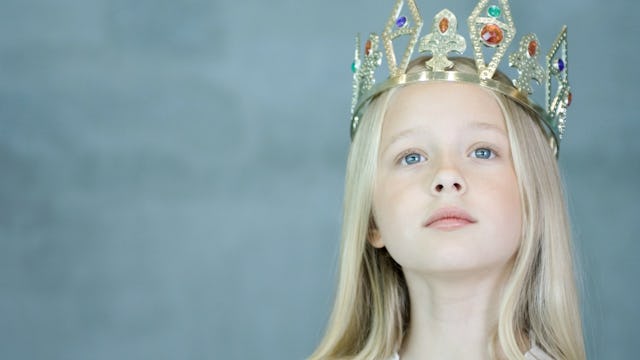5 Reasons I Don't Have A Problem With 'Princess Culture'

As a self-proclaimed feminist and the mother of a four-year-old daughter and eight-month-old son, you can safely assume I have some strong opinions on how a child of either sex should be brought up. Many of my opinions have raised eyebrows in conservative company, and I’ve had to hold my tongue on more than one occasion to avoid heated arguments (such as the time a distant relative thanked someone for buying his toddler son a toy truck for Christmas because he had “caught” him playing with his sister’s doll).
I do hold one view on parenting, however, that tends to surprise those who know I’m a feminist and that is this: I’m fine with princesses. That’s right, of the Disney variety. As I have watched my kid succumb to the cliché of American preschool girls in her obsession with all of the princesses, I sometimes get the question: How can you encourage that interest? The simple answer I generally give is that it’s inevitable, so why fight it? But there’s more to it than that.
So here are five reasons why I’m okay with Cinderella and the gang.
1. It is inevitable.
Perhaps you might avoid the obsession (good luck with that), but it’s near impossible to avoid the exposure to princesses. Unless you’ve banned all electronic devices and contact with the outside world, American girls will be exposed to and likely develop a strong affinity for the Disney princesses. As with most things when it comes to children, the more you object to something, the more fascinating it becomes to them. So while I don’t thoughtlessly encourage the interest, I don’t make a big deal out of it either.
2. Disney princesses have become increasingly more feminist in recent years.
I’ll concede that Snow White is pretty passive. She immediately falls in love with a man she doesn’t know at all, runs away from her evil stepmother instead of standing up to her, becomes a housewife to a bunch of guys, naively takes a bite of an apple offered to her by a creepy stranger, and mutely follows the prince she’s just met to his castle, where they presumably get married and live happily ever after. Most of these things are not things I want for my daughter or my son. But it’s important to note that the movie Snow White came out in 1938. Yes, it’s that old. Since then, we’ve been introduced to many more assertive princesses, such as:
Mulan: A bad-ass warrior (though not technically a princess) who bravely takes her father’s place to go to war, knowing it’s punishable by death.
Merida from Brave: She doesn’t want to get married based solely on a patriarchal tradition. She doesn’t act the way a traditional, well-behaved, feminine princess is expected to. The story is about healing her broken relationship with her mother, rather than being beautiful and finding true love.
Moana: A hero in her own right, fearlessly traveling across oceans to save her people.
Tiana from The Princess and the Frog: Opens her own restaurant and runs it like a boss.
Anna and Elsa from Frozen: Follows two orphaned sisters as they find themselves and each other.
Rapunzel from Tangled: Includes a love story, but is more focused on her quest for independence and personal enlightenment. Not to mention, she turns traditionally feminine attributes (a frying pan and long hair) into tools of self-defense and physical agility.
To be clear, Disney still has plenty of room to grow. They could strive toward more intersectional ethnicity, age, class, body type and size, and sexual/gender identities, but I’d still argue that they’ve made positive changes in their more recent films.
We also need to consider the fact that Disney is adapting classical fairy tales which are decidedly not feminist. In its more recent movies, Disney has actually taken a lot of liberties with the characters and plots, using creative license to adapt them to our modern world views. It shouldn’t come as a shock that Snow White follows the original tale much more than Frozen does, given the respective years each film was made.
3. They’ll grow out of it.
Sure, I’ve had fun watching the classics of my childhood with the next generation, but I stopped singing in the woods pretending all the animals were my besties around age ten (late? maybe.) Like most childhood obsessions, I know it’s a phase and I’m not nervous that it’s creating irreparable damage. Which leads me to my next point.
4. I loved (okay, love) the Disney princesses and I still chose feminism.
There were other, stronger influences in my life than Briar Rose (like my own hard-working, intelligent mother). My daughter tells me all the time that she’s as strong as Hercules, and I agree with her. She wants to be a general contractor when she grows up, so if she also loves to dress up as Princess Anna, I’d say so far we’re striking a good balance.
5. Parenting is more complicated than “allowing” or “not allowing” certain activities.
My kids will eventually be exposed to much worse societal ills such as racism, pornography, substance abuse, etc. I can’t protect or shelter them from all of those forces, although I will try to as long as I can. What matters more is how you handle it when they begin to learn about those things. Do you communicate and engage with your children at every stage? Do they know they can approach you about any subject, no matter how awkward or difficult it might be?
When it comes to something simple like a princess fixation, you don’t have to aggressively oppose it. Instead, try highlighting the deeper, more important qualities of the characters (even the villains!) like their courage, intellect, kindness, humor, etc. over how they look and what the prince—or anyone else—thinks of them.
This article was originally published on